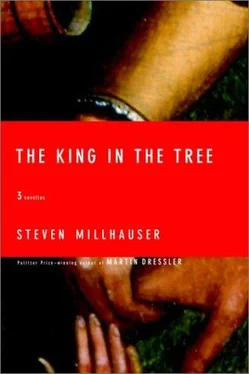“Oh look, Sir Juan! A spy.” Juan placed his hand on his sword hilt, but Mary was pointing to the brilliant summer moon.
“Come, Mary,” Juan said wearily, and as he walked with her along the winding river in the direction of the house, it struck him that they must have emerged on the distant bend of river that he liked to watch at night from his casement window.
Mary was not at breakfast the next morning; Georgiana said she was headachy and dull. “She said she dreamed about you all night,” Georgiana remarked, glancing at Juan and looking away. Juan, opening his mouth to reply, was seized suddenly by a shuddering yawn, which he violently repressed. His eyelids felt hot. Somewhere a fly buzzed. Georgiana fidgeted with her tea.
Sometimes he tried to imagine that Georgiana was playing an elaborate game, that she was trying to provoke his interest by an apparent indifference that concealed a secret passion. Because he did not believe what he imagined, which was contradicted by every visible sign, he was able to sustain the illusion only by avoiding Georgiana — an act that enabled him to imagine that she was aware of his avoidance and was moved by it to tumults of feeling she could scarcely suppress. When, helplessly, he found himself in her company, he would force himself not to look at her face. Instead he concentrated his attention on Mary, whose wide eyes looked at him with sorrow, or on his own hand, which lay before him like a hand broken from a statue and set down for his inspection — and sometimes, suddenly, he raised his eyes to Georgiana, whose head would be turned the other way.
He was always tired. At night he lay exhausted and awake, with burning eyes, and in bright sunlight he narrowed his eyes tightly, as if someone were flinging sand in his face. He tried to remember when it was that he had last slept well. As a boy in Seville he had slept in a big bed with gilt hawks on the posts. In the mornings his mother would come in and touch his face with her hand. Remembering, he touched his face with his own hand. He immediately withdrew it, as if something unpleasant had been pressed against his cheek, like the forepaw of a dead animal.
One night as Juan lay in his bed, staring through the parted curtains at the night sky framed by the casement window, he heard the sound of an opening door. He sat up in bed, bent to peer around a curtain, and saw Mary coming toward him in a hoopless white negligee. “Did I wake you, Sir Juan? Pray forgive me. I cannot sleep and have been wandering through the house these many hours. ’Tis strange, Sir Juan. Though I am always tired, yet I can never sleep. Is it not strange? Sometimes I fear my mind is not right. Georgiana says I never eat. But that is not true. I eat sorrow. I am very tired, Sir Juan. I will lie down here now.” Mary pulled aside the curtain and climbed into the bed. She lay down on her back beside him and did not move.
Juan, in his long nightshirt, crossed his legs irritably and wondered what the devil he ought to do. It occurred to him that never before in his life had he been in bed with a woman and wondered what the devil to do. And after all — after all! — why not? She had come to him in the night. She was a pretty wife — he liked pretty wives — and she was lying next to him on her back in his bed. It was not an impossibly difficult problem requiring the help of a mathematical tutor from the University of Seville. But say a second woman was present in the bed. Say she was a phantom woman with glowing eyes, who lay between you and the living woman beside you. Don Juan had slept with two women in a bed before. But what if the phantom woman was an enchantress who tied you in chains of fire while she lay against you, untouchable, twisting her body into every shape of desire? The living woman lay beside him, in her gown the color of moonlight. But when Don Juan tried to see her, she vanished in the glow of the other woman, who was a fire that burned out his eyes. For the phantom Georgiana was an un-woman, a more-than-woman, an absent presence who harmed him and mocked him and fevered him too. He thought of the monks, his laughable enemies, sickly haters of pleasure who tormented their bodies for the sake of heavenly visions. Now he too had become a monk, pious Brother Juan, a repellent abortion of a man. Nightly he was visited by his succubus. She lay on him like smoke, like the fur on an animal. She breathed in his ear and sucked out his breath through his mouth.
He looked over at Mary, white and still in his bed. And he felt an irritable, exasperated tenderness for poor Mary Hood, his pale sister in sorrow. There she lay, bound in her sad enchantment. He didn’t, after all, not desire her. For wasn’t it true that all women were the same woman, in the difference-dissolving night? Daylight was the element in which forms became distinct, the realm of analysis and discrimination, whereas in the night all things flowed and mingled. And wasn’t it true that he was not finicky in his choice of women, no fussy bourgeois who chose a woman the way you might choose a piece of furniture for the drawing room? No, he was Don Juan Tenorio, conqueror of thousands, who had ravished not only women so disturbingly beautiful that other men, seeing them once, had been changed forever, but also squint-eyed hags, blind beggar women with stinking breath, witch women, hump-backed women, diseased women with suppurating sores. Once he had bedded a bitter woman with one leg, who cursed him and wept. No, he didn’t not desire pretty Mary Hood. Rather, his desire had been consumed by the blast from a fiercer fire — diverted from the bodies of living women by the spell of a demoness.
His eyes burning with weariness, Juan slid down on his back and lay beside his sad sister. Her face was in shadow; a patch of gown shone white-luminous in a streak of moonlight. She might have been Georgiana — didn’t she look a little like Georgiana, if he turned his head a certain way? Three times he moved toward her, tricked into desire, for what did he care whether she was Mary or Georgiana or anyone on earth or in hell or heaven? Three times he fell back with an angry burst of breath. Toward dawn he woke her and led her from the room, for Augustus was sure to be up at any moment. No point in killing his friend over a woman untouched in the night.
He ate breakfast alone, in a shady corner of the breakfast room with a view of the sunny Ymber. His valet, appearing suddenly beside him as if he’d been conjured into existence by the mumbling of a spell, informed him quietly that the mistress of the house was not well and that her sister was tending her. Juan nodded dully, feeling a gloomy pleasure in his solitude and abandonment, and scarcely noticing as his valet dissolved into the bright morning air. After breakfast he went to the library and sat down in an armchair with a copy of The Philosophical Magazine. Immediately he sprang up and began pacing. He strode to the double doors, pulled them open, and nearly collided with a startled chambermaid in a long black calico dress and a white apron, hurrying past with a chamber pot in both hands and a dust brush tucked under one arm.
Outside he went round to the stable yard, where he stood inhaling a sweetly acrid smell of straw and dung before he swung onto his horse. He nodded at the groom and rode out along the graveled path through the gardens and into the parkland. For a while he kept to the riding path, then branched off onto a narrow woodland trail, coming out near the Isle of Athelney and riding until he found himself on the outskirts of Arcadia. A shepherd was sitting on a rock in the shade of a tree, playing his reed pipe. Half a dozen black-faced sheep grazed nearby. Juan sat on his horse. Idly he wondered whether the sheep were ingenious systems of turning gears covered with wool dyed to look dusty brown. It struck him that all of Swan Park was nothing but a gigantic mechanism, wound up and kept in good working order by that master watchmaker, Augustus Hood. And yet the squire of Swan Park would never allow the evidence of design in Nature to argue for the existence of an unseen Designer, because the universe, my dear Georgiana, is not Dr. Centlivre’s watch, but a riddle without an answer, a mystery that eludes your questioning. So by reason we climb by slow degrees to unreason: in the silence of the mystery, wonder is born. For love, my dear Georgiana, is not a watch in a pretty case, but a merciless angel bearing a sword of fire.
Читать дальше












